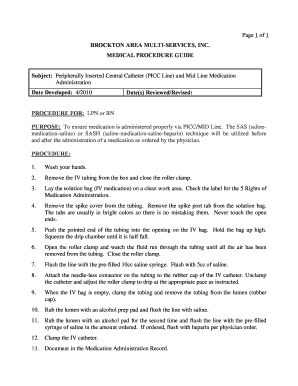
What to Expect During a Medical Procedure: A Complete Guide
Medical procedures can be overwhelming, whether they are for diagnostic purposes or to treat a specific condition. Knowing what to expect can help alleviate anxiety and make the experience more manageable. This guide aims to provide you with a comprehensive understanding of what typically happens during a medical procedure.
Preparation
Before the procedure, you will likely need to undergo some preparation steps. This may include fasting for a certain period, avoiding specific medications, or following specific dietary restrictions. Your healthcare provider will provide detailed instructions on what you should do to prepare.
It’s crucial to follow these instructions meticulously to ensure accurate results and minimize any potential risks or complications during the procedure.
Getting to the Clinic or Hospital
Arriving at the clinic or hospital on time is important. Give yourself ample time to avoid any unnecessary stress or rushing. Make sure you have all the necessary paperwork, identification, and insurance information with you.
If you’re unsure about the location, consider using GPS or maps to plan your route in advance. Additionally, it’s recommended to bring a trusted family member or friend along for support during the procedure.
Registration and Check-In
Upon arrival, the first step is usually registration and check-in. You will be asked to provide your personal information, medical history, and insurance details. The administrative staff may also ask you to sign consent forms, which ensure that you understand and agree to the procedure.
While waiting to be called in, take this time to ask any questions you may have and communicate any concerns to the staff. They are there to assist you and address your needs.
Pre-Procedure Evaluation
Once called in, a nurse or healthcare professional will escort you to the pre-procedure area. Here, they will perform a thorough evaluation, which may include checking your vital signs, asking additional questions about your medical history, and preparing you for the specific procedure.
This evaluation is crucial as it allows the medical team to tailor the procedure to your individual needs and identify any potential risks or contraindications.
Anesthesia
For many medical procedures, anesthesia is required to ensure your comfort and safety. Depending on the nature of the procedure, you may either receive local anesthesia, which numbs a specific area, or general anesthesia, which renders you unconscious.
If general anesthesia is administered, an anesthesiologist will be present to monitor your vital signs closely throughout the procedure. They will also ensure that you wake up safely and comfortably after it is complete.
The Procedure
The details of the procedure itself will vary depending on the specific medical intervention being performed. You will be informed in advance about the steps involved, the estimated duration, and any potential sensations or discomfort you may experience.
During the procedure, it is essential to relax and remain as still as instructed by the medical team. If you experience any pain or discomfort, inform them immediately so that they can make the necessary adjustments.
Post-Procedure Care
After the procedure is completed, you will be transferred to a recovery area where you will be monitored closely for any immediate post-procedure complications. The medical staff will ensure your vital signs return to normal and that you are stable before discharging you.
They will also provide you with post-procedure instructions, including any necessary medication, follow-up appointments, or lifestyle changes. It’s crucial to follow these instructions diligently to optimize your recovery and minimize any potential risks or complications.
Conclusion
Understanding what to expect during a medical procedure can help ease anxiety and allow you to prepare mentally and physically. Remember to communicate openly with your healthcare provider, follow the preparation and post-procedure instructions, and reach out for support when needed. Trust in the expertise and care of the medical team, and you will have a smoother experience throughout the procedure.

